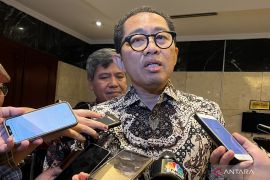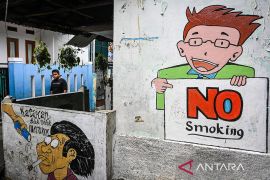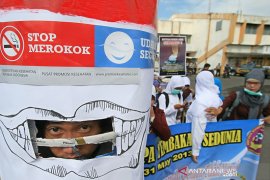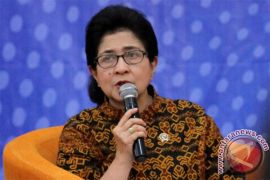"The Finance Ministry has not yet issued any new regulation regarding the retail sales price or excise tariff of cigarettes," Finance Minister Sri Mulyani said.Jakarta (ANTARA News) - The government is yet to take a decision on increasing the excise rate and sales price of cigarettes in the country as it still has to conduct a study to evaluate the pros and cons.
Since the proposal on the price hike was put forth in July, several quarters have suggested making careful evaluation before the cigarette price is hiked.
Legislator Mukhamad Misbakhun of Commission XI of the House of Representatives stated at a discussion in Jakarta on Saturday (Aug. 27) that the government should conduct careful evaluation before deciding to increase the excise rate and price of cigarettes.
According to Finance Minister Sri Mulyani, the government has not yet issued a new sales price and excise rate.
"The Finance Ministry has not yet issued any new regulation regarding the retail sales price or excise tariff of cigarettes," she noted in Jakarta last week.
The public has been involved in debates and discourse as reports circulated lately that President Joko Widodo will increase the price of cigarettes to almost two folds that of the current price to Rp50 thousand per pack.
The idea to increase the price of cigarettes was first raised by Hasbullah Thabrany of the Health and Economic Study Center of the Community Health Faculty of the University of Indonesia (FKMUI) at the Third Forum of the Indonesian Health Economics Association in Yogyakarta in late July 2016.
In Indonesia, the number of active and first-time smokers continues to increase every year. The increase in the number of smokers is triggered by the fact that cigarette prices are low at some Rp20 thousand per pack.
Based on the FKMUI studies, numerous smokers will stop smoking if the cigarette price is doubled. Of the one thousand respondents it has surveyed, 72 percent said they would stop smoking if the price of cigarette is hiked to some Rp50 thousand per pack.
A total of 54 percent of Indonesian children are now smokers, and thus, the government is determined to wean away children and women from smoking, as it could cause lung cancer, miscarriage, cervical cancer, and heart problems.
Minister Sri Mulyani acknowledged that the result of studies conducted by an economic study center on the impact of the price of cigarettes on their consumption has sparked public discourse on the price hike.
According to Heru Pambudi, the director general of Customs and Excise of the Finance Ministry, the government is still holding discussions with various sides on matters relating to a decision to fix the excise rate and sales price of cigarettes.
The finance ministry always invites all relevant parties for discussions when it wants to formulate a policy. Hence, no decision has yet been reached regarding the cigarette price hike.
"I can make assurance that no decision has been made yet," the director general noted.
A new decision on increasing cigarette prices usually comes into effect on January 1 of the year, or three months after the announcement of a new price. Thus, if a decision is taken, the new price will be announced at the end of September.
Based on Minister Sri Mulyanis explanations, the decision to set the excise rate and price of cigarettes is made in accordance with the Excise Law and is also included in the draft state budget.
"If a decision (is made this year), it will also be included in the Draft 2017 State Budget. Therefore, until now, we are still in the process of discussing it with various sides," Finance Minister Sri Mulyani remarked.
The government has set Rp157.16 trillion worth of excise revenue in the draft 2017 state budget, up 6.12 percent from Rp148.09 trillion set in the revised budget in 2016. Of the excise target, Rp149.88 trillion is expected to come from tobacco/cigarette taxes.
The tobacco excise target, which is set at Rp149.88 trillion for 2017, increased by 5.78 percent from Rp141.7 trillion set in the 2016 revised budget.
In the meantime, Deputy Chairman of the Peoples Consultative Assembly Oesman Sapta lauded the idea to raise the prices of cigarettes, as if the policy was implemented, it could restrict the younger generation from taking up smoking.
The high price of cigarettes will lead the youth to think twice before deciding whether to buy cigarettes, let alone if they belong to poor families. Thus, it is expected that the number of first-time smokers would be reduced in future.
The price hike will also have an impact on the tobacco farmers, thus they will enjoy the benefits of the policy, he added.
The government is raising the idea to increase prices up to about Rp50,000 (US$3.76) per pack. The normal prices of cigarettes currently range from Rp15,000 to Rp25,000 (US$1.13 - US$1.88) per pack.
This means that a smoker who consumes one pack of cigarettes a day would spend some Rp1.5 million per month for cigarettes, a price which is higher than the workers monthly basic wage of Rp1.4 million in West Nusa Tenggara Province.
Cigarettes/tobacco taxes contribute a large portion to the countrys state receipts. They contributed Rp139.5 trillion in taxes to the state in 2015, or about 7.9 percent of the state revenues set at 1,761.6 trillion in the revised 2015 state budget.(*)
Reporter: Andi Abdussalam
Editor: Heru Purwanto
Copyright © ANTARA 2016











